Songkran, everything to know about Thai New Year in Bangkok and Chiang Mai
Welcome to the best water festival of the year and the main reason we came back to Thailand a second time. This is Songkran, the best way to ring in the Thai New Year. It combines family, temple visits, and the biggest water fight you’ve ever seen. And how lucky were we to celebrate it in two different cities! Here’s everything you need to know about celebrating Songkran in Bangkok and Chiang Mai.
Before we talk about the water fight, let’s talk about what Songkran is and why this water fight is actually an important part of the ritual.
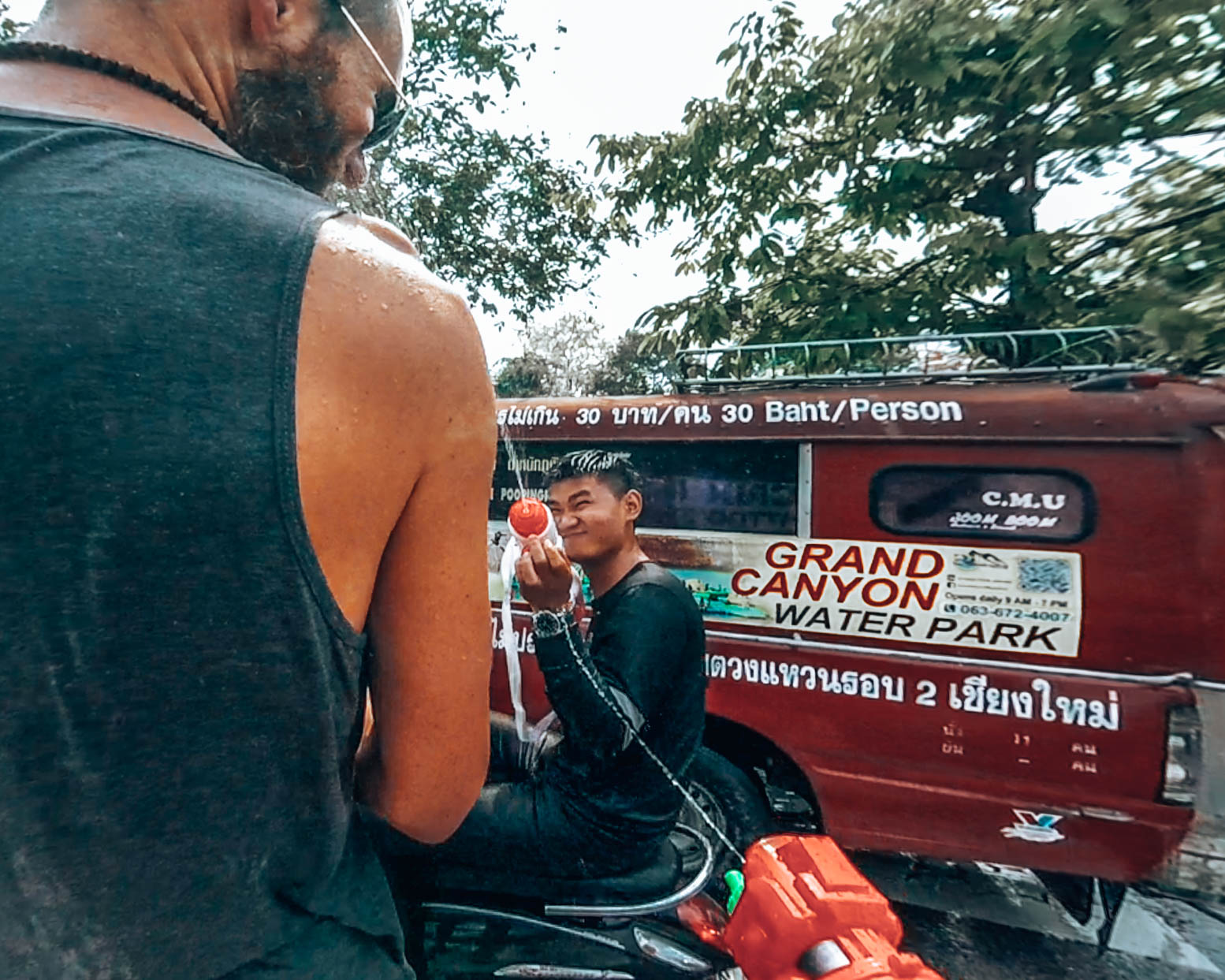
This article may contain affiliate/compensated links. For more information, please see our disclaimer here. We take all the efforts necessary to ensure the information included in this post is accurate, correct and current, sometimes, things just change! Travel information like opening hours, business operations and prices may change. If you find anything in this post that is incorrect or outdated, please let me know in the comments so I can update it for other readers. Cheers!
Table of Contents
What to expect during Songkran
Songkran is the moment that most Thais (and tourists) wait for every year. It’s the New year in the Hindu and Buddhist solar calendars. Usually, they celebrate it between April 13th and 15th, though it may vary some years. In 2020, Songkran will be celebrated from Monday, April 13 to Wednesday, April 15.
Locals have these days off to celebrate and ring in the new year with friends and family. Most large businesses and offices are closed, though smaller shops, bars, and restaurants stay open.
Usually, big cities like Bangkok, experience a mass exodus with residents traveling back to their home towns. But don’t worry, there are still tons of people in town ready to celebrate. Just know that traveling around on those dates may take longer than expected and tickets get bought up fast. If you plan on leaving larger cities during the days around Songkran, make sure you buy your tickets as early as you can.
Here are some other things you can expect during Songkran:
- Getting wet: What else were you expecting? If you’re out during Songkran, you’re guaranteed to get wet. If you don’t want to get wet. stay off the main roads and away from major attractions, including temples, as these get cleansed with water throwing too.
- Closed stores and businesses: As we mentioned, Songkran is a national holiday, so expect to see stores and businesses (including some museums and landmarks) close during these 3 days. Some major chains (think 7Eleven or McDonalds) do stay open during Songkran.
- Inclusion & diversity: The Thai New Year brings everyone, from all ages and walks of life together. That’s the beauty of this day! Anyone can get involved in the celebrations, so don’t be surprised to see the elderly, middle-aged, and youth splashing water onto one another. It makes no difference if you’re a foreigner or a local, you’ll be splashed regardless!
- Drunk people: This is mainly around Khao San Road, but like with any party, expect people to get drunk. And even if there is a water curfew that starts at 9 PM, alcohol consumption continues long into the early morning hours. Just like you see with any other New Year’s celebrations around the world! As always, be careful of pick-pockets and drunk drivers.
- Booking in advance: If you plan on getting to a different city or staying in hotels in major cities, make sure you book in advance. Locals usually spend their time with their family, so tickets for the trains, buses or airlines may get fully booked weeks before the holiday. The same goes for hotels, as visitors flock to the city to party.
- Fun! Fun! Fun! Just like with any New Year’s celebrations, the city comes to life with contagious energy! Everyone is happy and ready to party!
Celebrating the traditions of Thai New Year
During this religious holiday, people pay respect to Buddha, to the monks, to their families and friends. That’s why the Songkran celebrations actually start at home.
Traditionally, Thais perform the Rod Nam Dum Hua ritual on the first day of Songkran, the National Elderly Day. During this ritual, young people pour fragrant water into their elders’ palms as a gesture of humility and to ask for their blessings.
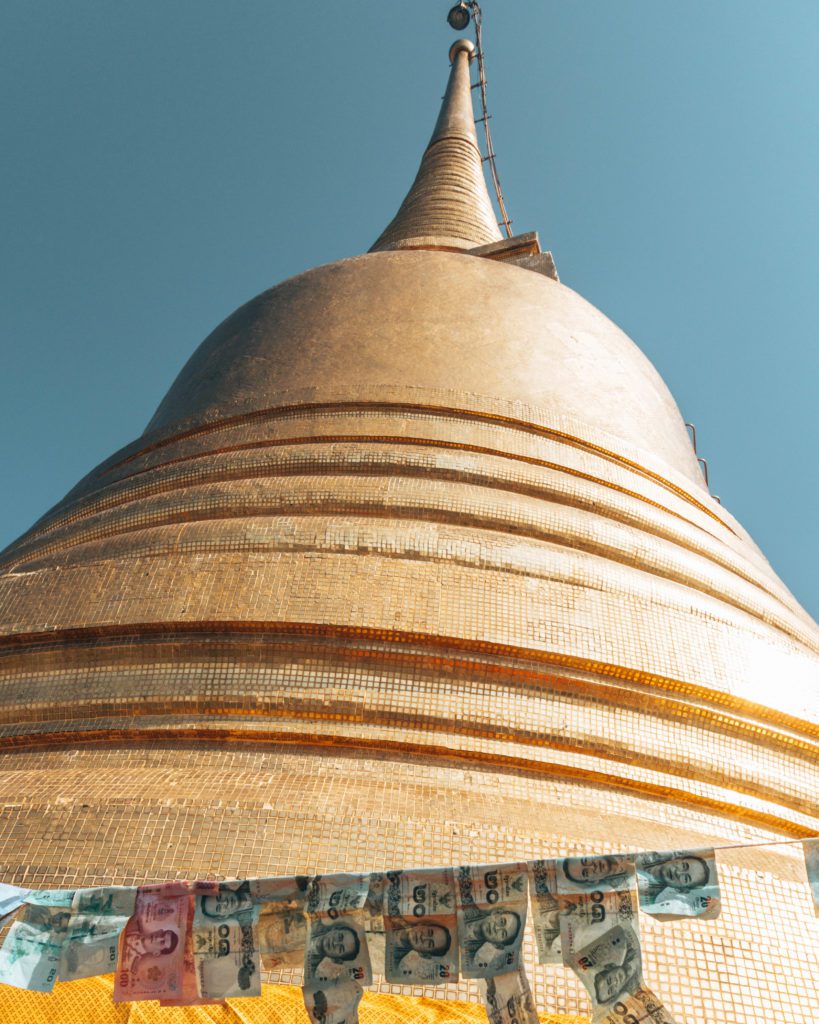
The second day of Songkran is National Family Day. Families wake up early and give alms to the monks. Then, the rest of the day is spent sharing quality family time, either cleaning out their homes or just being together. Expect to see crowds at the temples, so if you want to respectfully partake in these ceremonies, go ahead. But if you’re looking to avoid crowds, the temples should be avoided.
Another important religious ritual during Songkran is ‘Bathing the Buddha image’. Devout Buddhists pour fragrant water over Buddha statues both at the temple and at home. More religious Thais engage themselves in Buddhist ceremonies and merit-making activities throughout the holidays.
We visited some temples on this day to see what making merit was all about. Believers would line up and pour water on Buddha statues in temples. They would sit and pray, make donations and spend a peaceful moment at the temple with their families. We saw people of all ages, from children to the elderly, make their way to the temples to make merit.
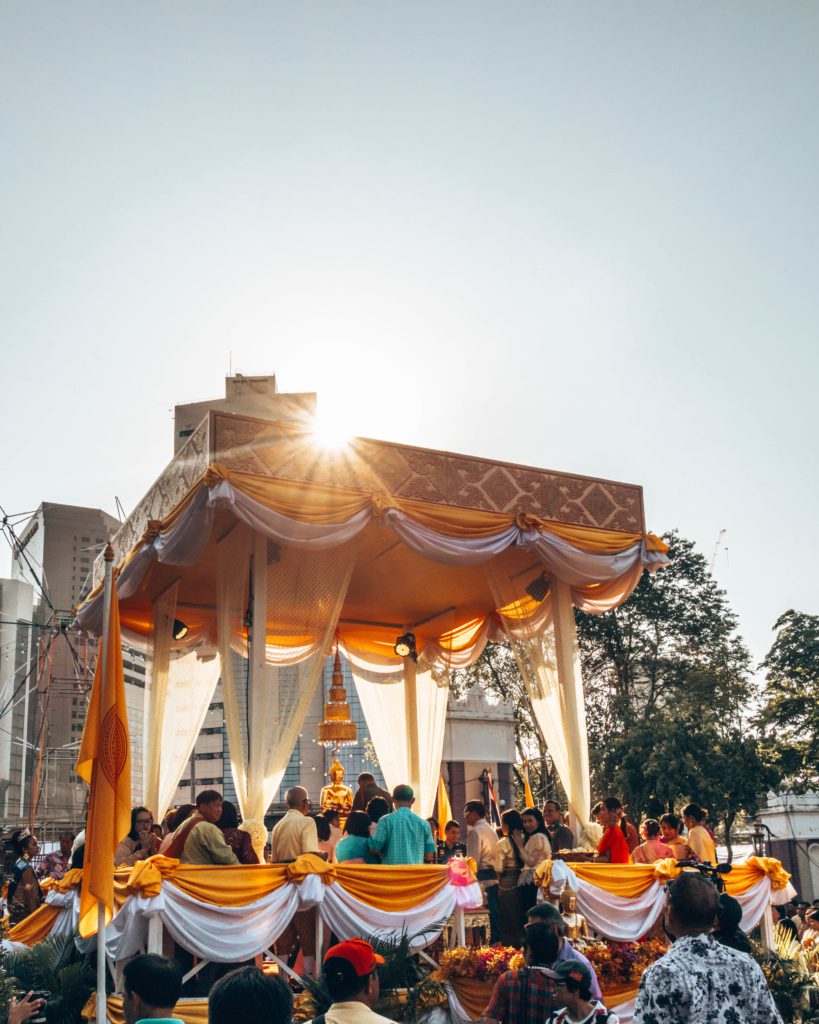
As you can already see, water plays a big role during all the Songkran ceremonies. Just like in the water fight, the splash of water is a symbolic way to wash off all the misfortune, to start a fresh and clean new year. A perfect way to start the year, if you ask us!
Songkran, the best water festival of the year
Ok, now for the fun part. The famous water fight. Basically, for these three days, everyone takes to the streets to participate in water fights. They usually start in the morning and are “supposed” to end when the sun goes down. Though it seems like it never ends.

If you think you’re going to get out of Songkran without getting soaked, think again! No one is dry for the next three days. Even if you don’t have a water gun. Even if you walk with your hands up, as a sign of submission. Even if you wear a raincoat. No one is safe! If you want to stay dry, stay home. And this was true for both in Bangkok and Chiang Mai.
How to avoid getting wet during Songkran
Ok, so this is going to be very direct, but if you want to avoid Songkran, don’t come to Bangkok, Chiang Mai or the Thai islands… or other major cities and towns in Thailand…
We came specifically to celebrate Songkran, and we wanted to live it in both Chiang Mai and Bangkok. If your travel plans make this unavoidable, or if you want to celebrate but only for a short time (like when we had to skip a day to travel between the two cities), know that it’s pretty easy to get away from the party. Most of the water throwing is limited to the areas mentioned above.
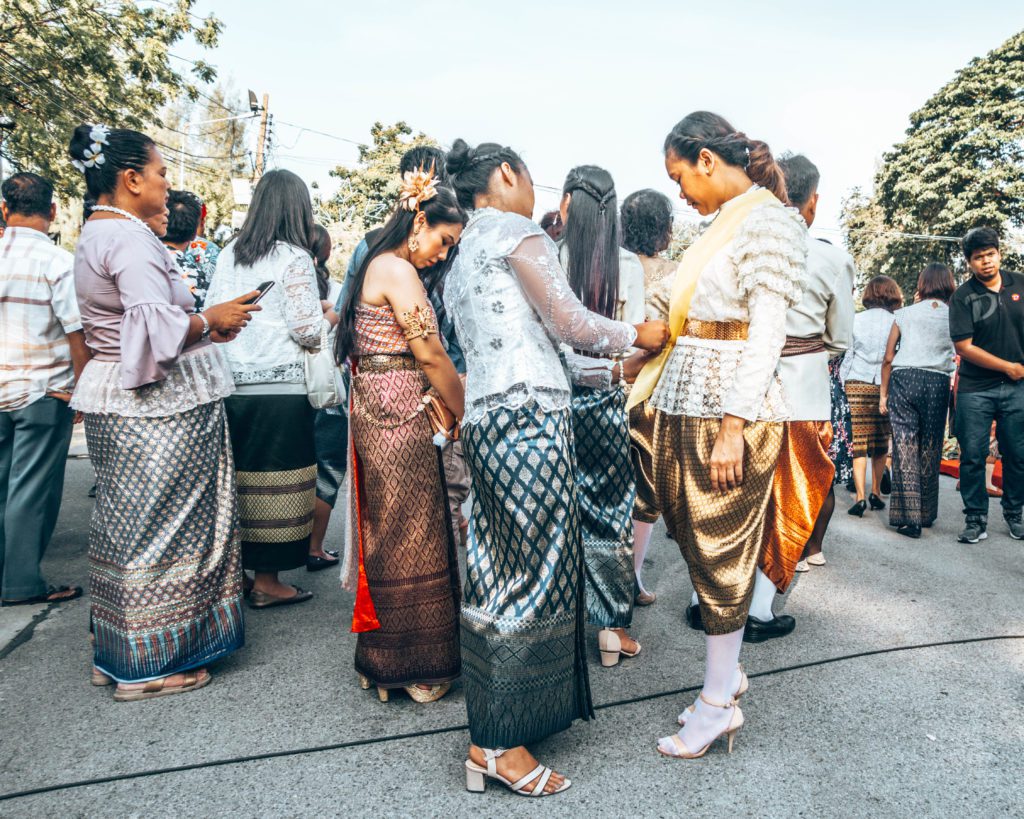
For example, we partied on Silom road, but as soon as we left the area to walk to Lumpini Park, where some official celebrations were happening, no one was throwing water. The same goes for our walk from our nearby hotel. The locals started splashing us when we were a corner away from Silom Road.
If you really want to stay as dry as possible, take a Grab taxi across the city. That’s the driest way to get around!
Celebrating Songkran in Bangkok
We celebrated the first day of Songkran in Bangkok, on Silom Road. A stretch of the street, near Lumpini Park, is blocked off for the epic water fight.

The festivities take place in a few main streets. Yes, you can stay dry if you are far from the action, but don’t bank on it. Kids will often sit on balconies and pour water on passers-by. So, good luck, you’ll still need it!
People walk up and down the street, splashing each other with water guns and buckets. They will also splash you from the platform of the MRT station that is above the street. The buckets, and sometimes hoses, are reserved mainly for the Thai shop-owners.
That’s because, in Bangkok, they charge you to fill up your water bottles. And the water doesn’t come cheap. You’ll be paying between 5 and 10 THB ($0.15 and $0.30USD) to fill those puppies up. So keep some change on you.

The water here is mainly clean water from the tap, but still, try not to drink it. But again, good luck as many people will aim for your face when they spray you. Not quite playing fair, but it seems like fairness is not on anyone’s mind during Songkran’s water fight.
After you’re done spraying and getting sprayed, you can head to Lumpini Park where the main festivities are taking place. The park is full of games, rides for kids, festival fare and shows. They also hold an annual beauty contest during this time as well.
We found that Lumpini Park was the perfect place to dry off in the hot Bangkok sun, enjoy the delicious local food, and watch the more traditional festivities of Songkran take place.
All in all, we had a great time celebrating Songkran in Bangkok. The vibes were good, the fights were fair but paying for water was less fun. And best of all, we were staying at Cloud on Saladaeng, a stone’s throw away from the action. But more on that later…
Where to celebrate Songkran in Bangkok
There are a few places in Bangkok where you can celebrate Songkran in all its glory.
- Silom Road: This is where we celebrated Songkran and we loved it. Located near Lumpini Park, this is the perfect place to experience Songkran in a more local way. Just be aware that you will be splashed from all around, including from the railway station above!
- Khao San Road: This is probably (no, for sure) the most popular place to celebrate Songkran in Bangkok. Things get very loud and wild here on a regular day, so you can only imagine what Songkran is like. Don’t be surprised to see people get more and more drunk as the day goes on (especially when the sun goes down)
- Siam Square: If you want to celebrate with your kids or your family, head to Siam Square for “White Songkran”. White Songkran is the PG-version of Songkran. It’s more family and child-friendly. There’s no alcohol or scantily-clad dressed people here. The party is definitely less rowdy and better for the kiddos.
Celebrating Songkran in Chiang Mai

For Day 3 of Songkran, we were in Chiang Mai. And wow, were we in for a surprise. If we thought Bangkok was crazy, Chiang Mai was on a whole new level.
We celebrated mainly in the Old City, but people everywhere were armed with buckets and hoses, ready to splash anyone and everyone. Forget any rules you may know about Songkran, they don’t apply here in Chiang Mai.
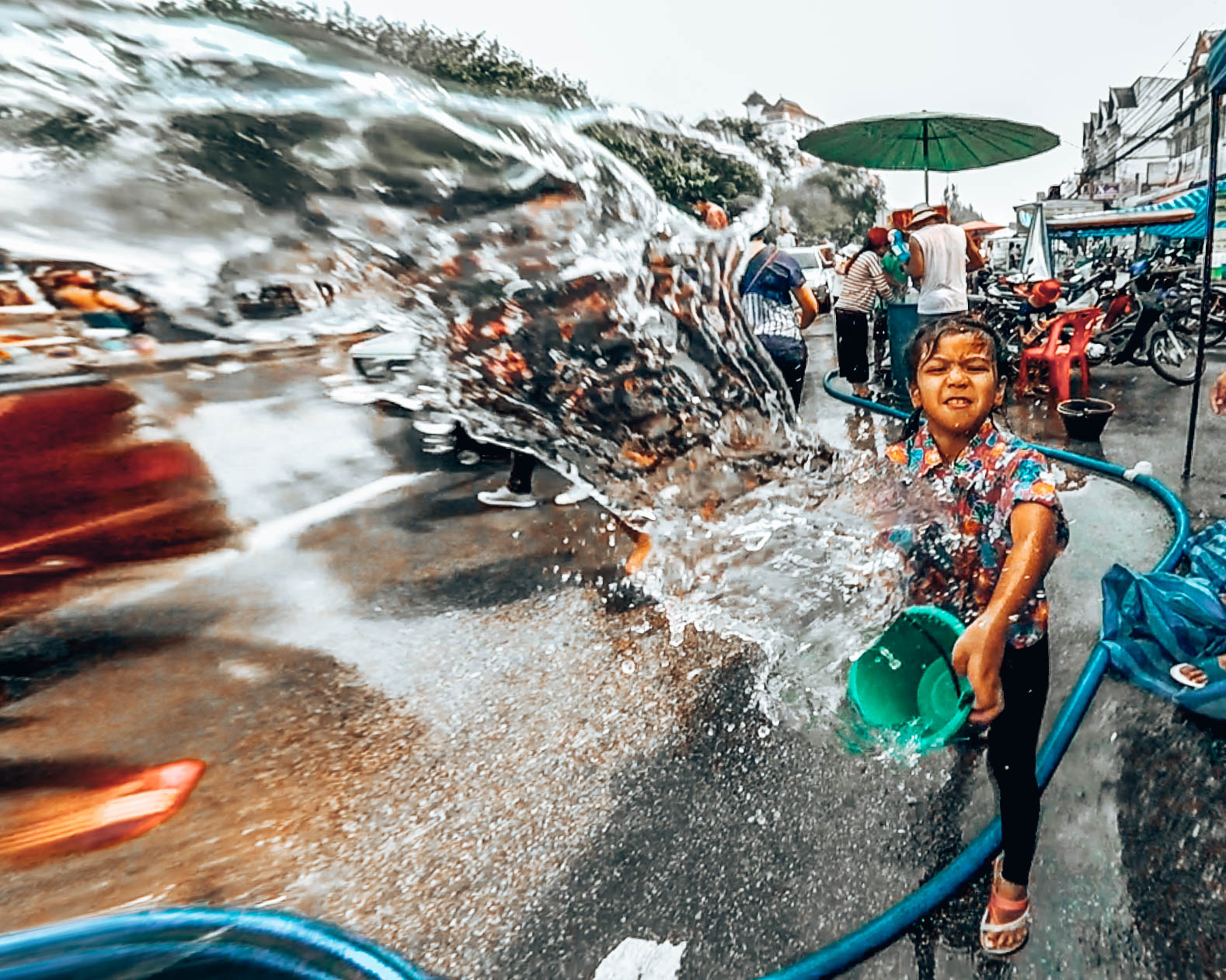
Kids were lining up at the river, pulling water out to splash everyone. Firefighters had their hoses set up splashing everyone and filling up their bottles. People were sitting on the back of pickup trucks and splashing pedestrians as they drove by. No chance you were getting them back. It was total chaos and it was a freakin’ blast!
Within 5 minutes of leaving our hotel, we were already soaking wet. From head to toe, drenched in ice-cold water. We got ambushed by kids hiding behind a wall. Then, the sneak attack by the old couple on their balcony. Finally, the quiet restaurant owner who snuck up on us and poured a whole bucket of ice water on our backs.
We walked through the city, splashing and getting splashed, laughing until our abs hurt. This is what being a kid again feels like!
Where to celebrate Songkran in Chiang Mai
Chiang Mai sure knows who to party during Songkran. Here are the main areas you can celebrate:
- Old City: This is probably the best place to celebrate Songkran. This is where you’ll see the biggest water fights and tons of entertainment too. Even a few blocks away, people will be throwing water. The biggest celebrations will happen at Thapae Gate and all around the moat.
- Nimmanhaemin Road: Also called Nimman Road, this is one of the trendiest areas in Chiang Mai. Expect to see tons of people, water battles, and entertainment (think performers and DJs) mainly at the entrance of the Maya mall.
- Join a tuk-tuk tour: We didn’t know about this option until the day we saw it with our own eyes… and got splashed by one of them! We saw tuk-tuks with buckets of water driving around and splashing people. We even saw people on the backs of pickup trucks with barrels of water, water guns, hoses, and buckets. You’ll get to cover more ground and see more of the city.
A winning strategy for the Songkran water fight
Just like in any war, you need a good strategy. Here are the Songkran techniques that worked best for us:
- In Chiang Mai, grab a bucket, find a watering hole and splash away
- In Bangkok, get a few people together, screaming all together and spraying in one direction. An epic water war will inevitably follow!
- It might sound mean but aim for the kids. Their response is usually hilarious. They are ruthless and will fight back and their parents will counter-attack too.
- If you get a gun, get one that has a large reservoir and a lot of power. It will make things more fun. But more on this later!
- Work out your trigger finger. It will be sore by the end of the day.
- Make as many friends as you can, you will need them during an ambush (and yes, you will get ambushed. No one is safe!)
- Don’t shoot people with bigger guns than you… you will lose
- Be a water fight ninja. Shoot, then look away. They’ll never know who hit them!
- The colder the water, the better!
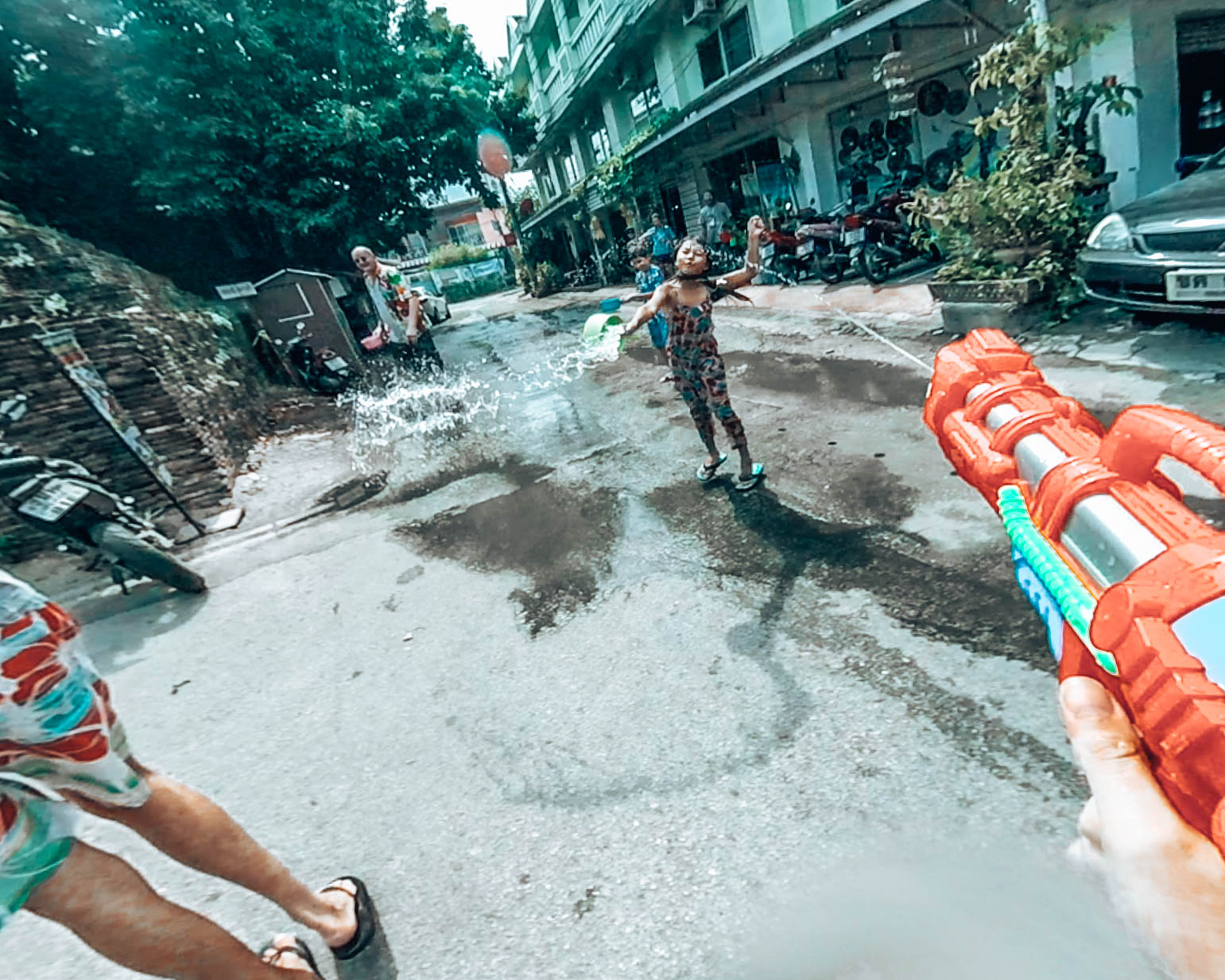
Tips to make the best of Songkran
There’s more to this festival than the water fight. Try to experience as much of it as possible. Give alms and make merit, or if you prefer, just observe people who are doing it.
- Protect your gear. Use waterproof bags to protect your valuables. If you can, avoid bringing tons of things with you. Some money, your phone or GoPro, and you should be good
- Watch your belongings. Pickpockets are more present as people are less observant when getting splashed.
- Wear dry-fit or quick-drying workout clothes. You will be soaked for a very long time, if not. Also, this is not a day to dress up!
- Use public transportation. Especially if you’re heading to one of Songkran ‘hotspots’. Traffic gets rough and accidents are more prone to happen on this holiday.
- Wish the locals a happy new year in Thai. They will appreciate the effort you’re making. Just say: “Sawasdee Pee Mai!”
- You can’t splash just anyone. Monks, babies and the elderly are off limits… although, if some elderly people splash you, don’t feel bad to counter-attack!
- Don’t drink and drive. Obviously!
- Only use clean water, and without ice. Though it does seem that the kids in Chiang Mai using the river water didn’t get this memo.
- Safety first. Don’t throw water at motorcyclists. But again, this was not respected in Chiang Mai!
- Smile and have fun. Don’t get upset, just splash back.
What to pack for Songkran
The least you bring, the better. Make sure that you don’t mind if whatever you bring gets ruined or wet. And, obviously, make sure your electronics are safely packed because people will throw water regardless of what you have on you!
Here are some musts we brought:
- Waterproof camera gear: We had our GoPro, which was perfect to document this day! If you have an underwater dome for your camera, then bring it along, if that’s how you’ll be shooting. But like we mentioned, the less you bring, the better!
- Waterproof phone case: If you want to take pics and videos, if you are texting friends, or using your phone to get around the city, you need a waterproof phone case! Lucky for us, we had our GoPro and our hotel was right near Silom Road, so we didn’t need this!
- Dry bag: If you’re going to bring a camera or other valuables with you, make sure you have a dry bag. We use ours when we go scuba diving too, so it’s one of the things we always have with us. It will be perfect to keep your wallet and other goods dry.
- Dark and fast-drying clothes: Sure, you could pretend this is a wet t-shirt contest, but light colors are not your friend when buckets of water are being dunked all over you! We mentioned it before, but we highly recommend you wear clothing that dries fast. We opted for our hiking outfits, the dry-fit variety!
- Swimwear: Instead of wearing your regular undies, go for swim trunks or your bikini under your dry-fit clothes. Swimwear dries much faster, won’t get ruined, and will keep you comfy all day!
How to have a sustainable Songkran
By now, you know that sustainability is one of our major concerns when we travel. And seeing the amount of water being thrown during this 3-day festival sure makes it hard to support it, although we do respect these traditions. Heck, we came back to Thailand just to live this experience! But the good news is that there are sustainable ways of celebrating Songkran!
- Don’t buy a water gun: We’re going to be honest, we bought a water gun… and then regretted it! They’re cheap, they’re plastic, they’re pretty much single-use, and then they end up in landfills. We only bought one water gun, that we shared, and that we brought with us to Chiang Mai, so we did try to use it as much as possible. We even gave it to some local kids after Songkran, but truth is, we could have just not bought one. In many places, people would have huge buckets of water out, so you can grab a reusable container and throw water there.
- Always have a reusable water bottle: Regardless of Songkran, we highly recommend you bring a reusable water bottle to Thailand (or South-East Asia, for that matter). The weather in April is really hot, so you will be getting thirsty. We love our Lifestraw Go for this. It makes drinking tap water (or any freshwater) possible, without getting sick! No need to buy those terrible plastic water bottles!
- Limit the amount of water you throw: This takes some self-control, but instead of throwing water on others, just walk down the lanes and enjoy being splashed and sprayed. You don’t have to add to the amount of water being thrown. If you’re celebrating on one of the Thai islands, replace freshwater throwing with seawater! Or, like they did in Chiang Mai, head for the river!
- Watch out for your electronics: Electronics are major contributors to landfills and a huge environmental burden to make. Instead of having your phones or camera gear ruined by water, pack them properly. Go for a waterproof case, or bring waterproof electronics. This way, you won’t be throwing out electronics unnecessarily or wasting money on a replacement phone or camera.
The dark side of Songkran
These types of celebrations do have a negative impact on the environment and on the people. As always, one of our main concerns is the unsustainable practices that come with Songkran.
- Poor use of water: In a country that already has poor water supply, and especially, clean water supply, it seems a bit silly to waste such large amounts of water.
Water scarcity is a global problem that will only grow with time. Scientists estimate that Thailand will feel the impacts of this scarcity in 2025. Already, in 2016, the Thai government deemed the shortage of clean water a national crisis. So it just seems so counterintuitive to have a holiday where tons of water are literally thrown out the window. Experts in resource conservation have said that aquatic festivals, like Songkran or Vardavar in Armenia, are a major drain on freshwater resources. - Road accidents: Every year, the Thai government puts in efforts to warn locals and visitors about safe driving and avoiding drunk driving. Mixing alcohol with wet roads and water splashing is a recipe for disaster. If you can avoid driving or being on the road, please do. Use the public transport system instead or take a Grab car.
- Water sickness: We know that tap water is not safe to drink in Thailand. And although people are supposed to only throw clean water, that’s not always the case. In Chiang Mai, we saw tons of people getting water out of the river to throw it on people. Uck! It’s hard to do, but if you can, try to avoid getting water in your mouth (or spit it out when you do!)
Where to stay in Bangkok during Songkran

Welcome to Cloud on Saladaeng
We were so happy to stay at Cloud on Saladaeng. Close enough to the action on Silom toad and Lumpini Park, but nestled away on a little street, so the party was never a bother. And the helpful and friendly staff always made sure we knew what was going on so we didn’t miss a beat.
This beautifully designed hostel opened three months before we stayed there. Inspired by the Chinese family who used to live there, they have kept some of the charms of the old building, like the gate at the entrance and the dragon columns.

Ready to host travelers with a range of budgets, they have dorm rooms, private rooms with shared bathrooms and deluxe rooms with an ensuite. The rooms may not be big, but they are perfectly sized for the number of people that they hold. And don’t get us started on the bed! After spending countless nights on mattresses as hard as rocks, this bed was literally like sleeping on a cloud!
We loved this hostel so much. From the free snacks available all the time, along with free drinking water and coffee, the kitchen and fridge that were open to our use, the showers that were equipped with shampoo and body wash, no detail was left unnoticed. Especially since most of these little things were good for the environment.
We could not recommend Cloud on Saladaeng any more! During Songkran or not, it’s well-situated, cozy, friendly and overall awesome! Like being on cloud 9 for a few days in the hustle and bustle of the Kingdom’s capital.
We had an amazing time during Songkran. This is a once in a lifetime experience we will cherish forever. It’s not often that you get to live these local experiences and partake in a country-wide celebration.
Have you celebrated Songkran? Is it on your list now?
We put a lot of time and effort into the content we create. Please like, comment and share, every action on your part helps us out tremendously and is very much appreciated.
You can also help us by pinning it for others to find.
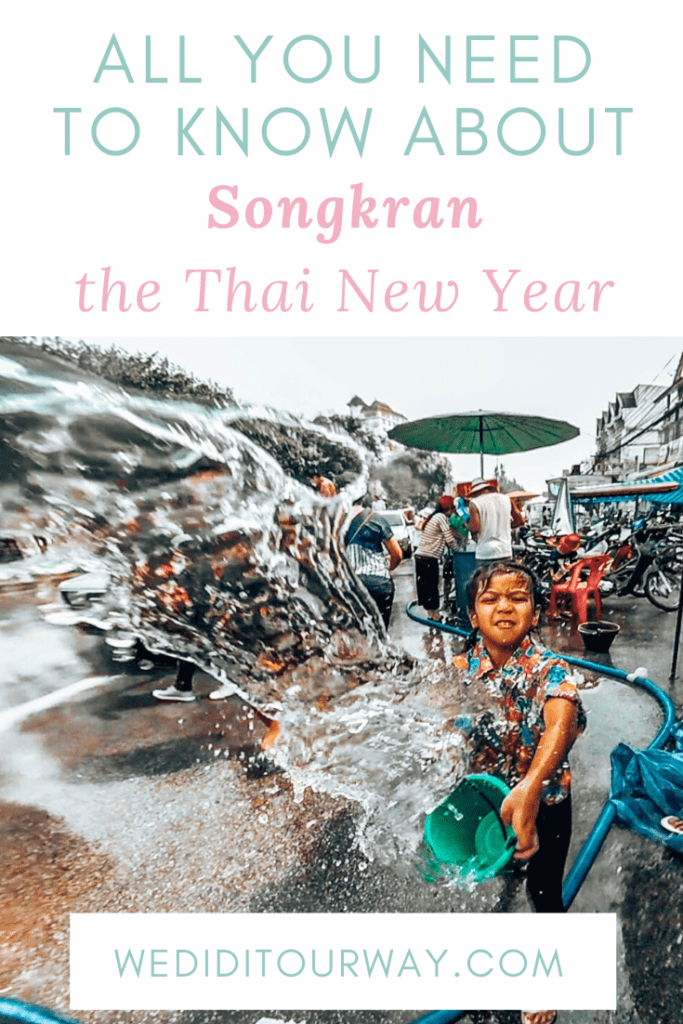
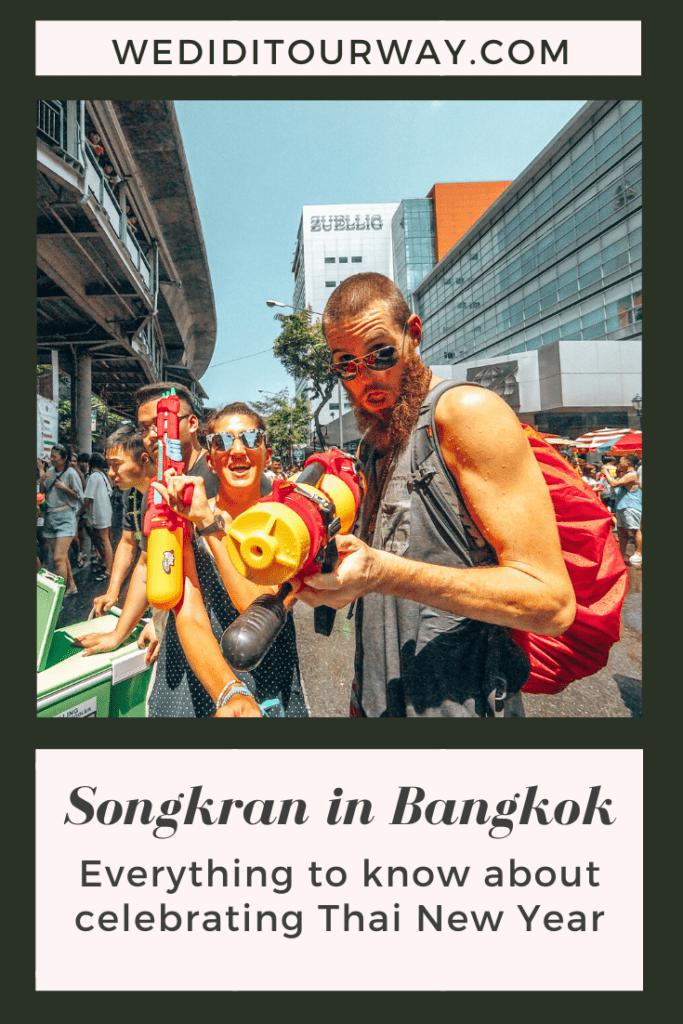
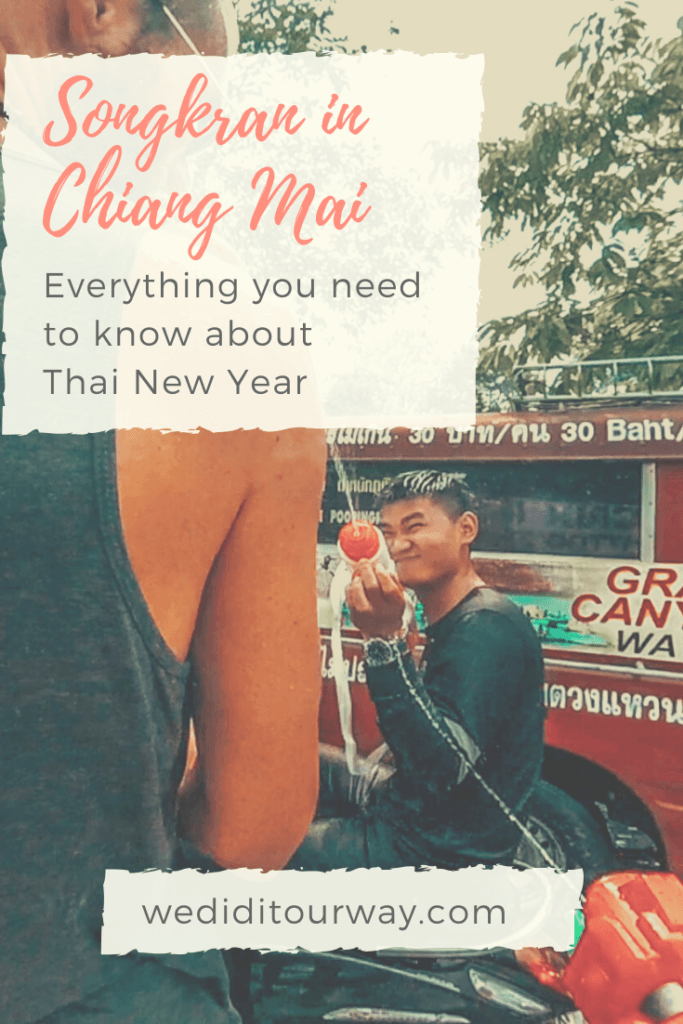
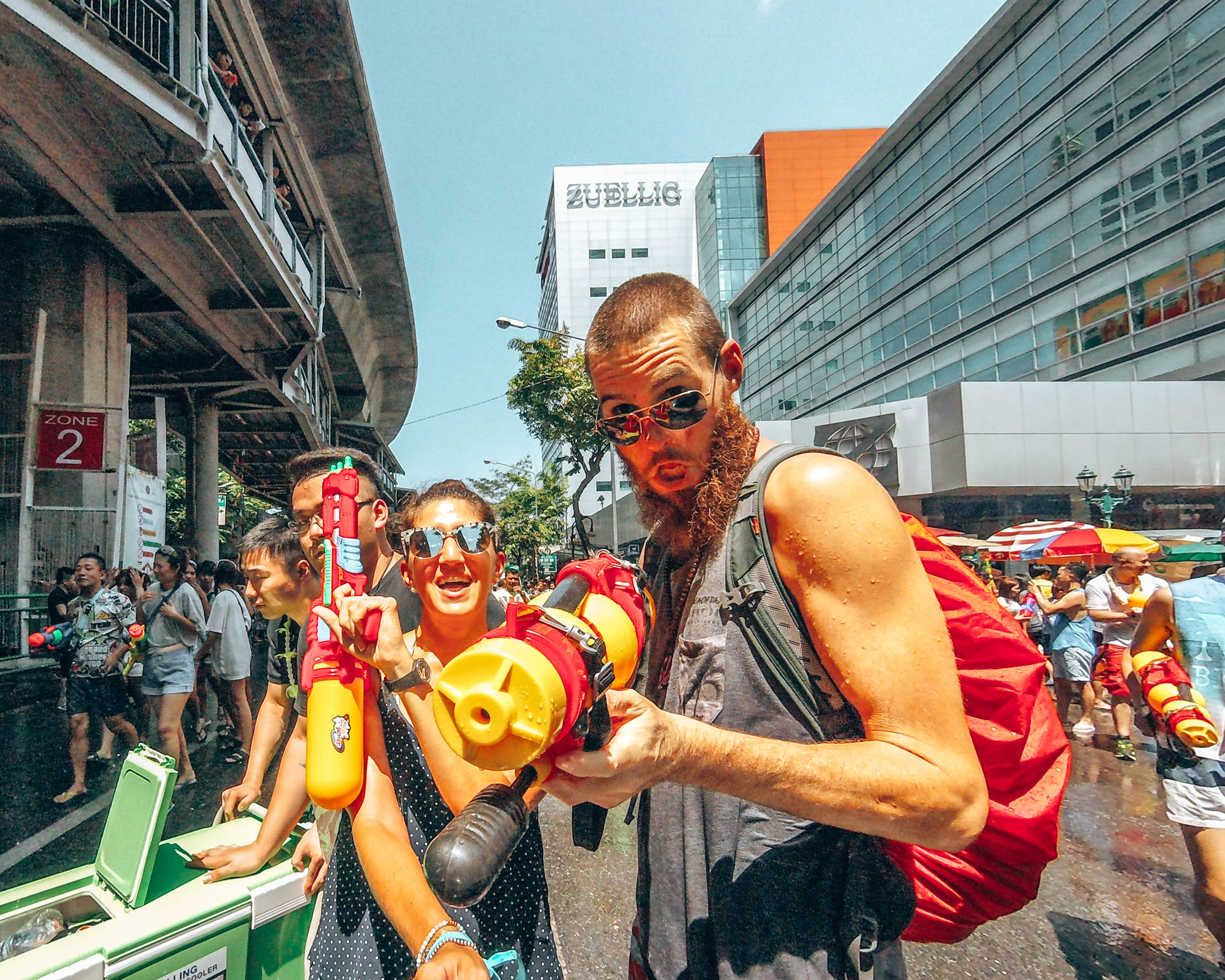
One Comment